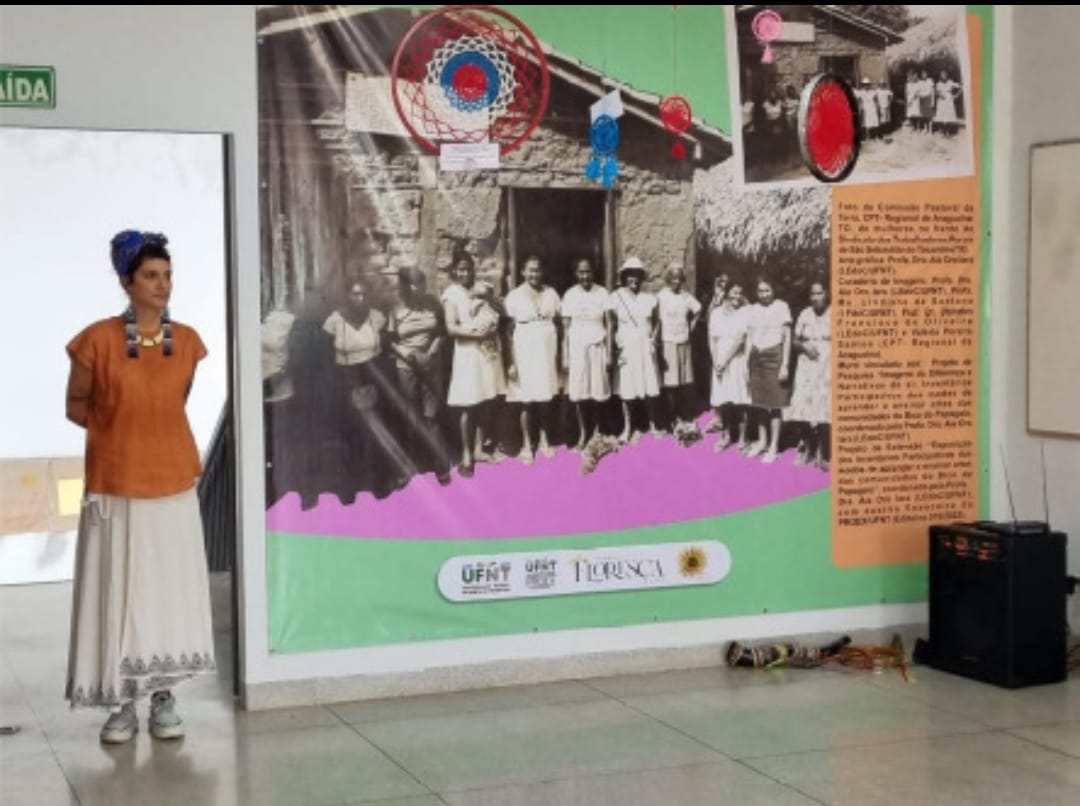Comunicação Decolonial
Encontro de Saberes para a Conquista de Direitos
DOI:
https://doi.org/10.23925/2318-5023.2022.n6.e60819Palavras-chave:
Comunicação Decolonial, Cultura Visual, Epistemologias Decolonais, Interculturalidade CríticaResumo
Propomos, neste artigo, algumas reflexões que giram em torno de um pensamento comunicacional que se paute pelo enredo das práticas e epistemologias decoloniais. Essas práticas e epistemologias se expressam não somente nas abordagens teóricas que consolidam este campo, mas também nos processos e dinâmicas de produção do conhecimento a partir da interculturalidade crítica em espaços formais e informais de ensino. Observarmos as experiências pedagógicas de formação de professoras/es do curso de Licenciatura em Educação do Campo (LEdoC), da Universidade Federal do Norte do Tocantins (UFNT), tendo como ferramentas teóricas as discussões dentro dos campos da Comunicação, decolonialidade, Cultura Visual e Arte/Educação. Buscamos destacar na produção de conhecimento das experiências pedagógicas de estudantes da LEdoC/UFNT, o encontro de saberes que pode ser gerado a partir de relações interculturais críticas. De que maneira a Comunicação, a Cultura Visual e a Arte/Educação podem atuar em favor da conquista de direitos de povos e comunidades tradicionais? Da mesma forma, de que modo os povos e comunidades tradicionais podem colaborar para a construção de novas epistemologias na Comunicação, na Cultura Visual e na Arte/Educação? Do ponto de vista metodológico, o artigo se caracteriza como um estudo teórico-conceitual que investiga conceitos que se encontram nos campos envolvidos, em diálogo com a prática da Pedagogia da Alternância, na formação de estudantes da LEdoC/UFNT e suas relações com os saberes de suas comunidades e pedagogias culturais. Constatamos que as experiências pedagógicas analisadas reconhecem, valorizam e ampliam as dinâmicas e fluxos de produção de conhecimento das comunidades envolvidas.
Referências
ANDRADE, P. D. de. Pedagogias Culturais: uma cartografia das reinvenções do conceito. 2016. Tese (Doutorado em Educação) - Faculdade de Educação, Universidade Federal do Rio Grande do Sul. Rio Grande do Sul, 2016. Disponível em: https://www.lume.ufrgs.br/handle/10183/143723. Acesso em: 21 jan. 2022.
BARBOSA, A. M B. Mediação cultural e social. In: Arte/educação como mediação cultural e social. BARBOSA, A. M B; COUTINHO, R. G. (org.). São Paulo: Editora UNESP, 2009. p. 13-22.
BERGER, Christa. A Pesquisa em comunicação na américa latina. In: HOHLFELDT, A.; MARTINO, L. C.; FRANÇA, Vera V. Teorias da Comunicação: conceitos, escolas e tendências. Petrópolis: Vozes, 2001.
CANDAU, Vera Maria (Org). Rumo uma Nova Didática. 23. ed. Petrópolis, RJ: Vozes, 2013.
CARVALHO, J.J. e Águas, C. Encontro de Saberes: um desafio teórico político e epistemológico. in: Colóquio Internacional Epistemologias do Sul: aprendizagens globais Sul-Sul- Sul- Norte e Norte-Sul. Boaventura de Sousa Santos e Teresa Cunha (Ed.). Volume 1 Democratizar a democracia. June, 2015.
CENTRO DE CULTURA LUIZ FREIRE (CCLF), 2006. Caderno do Tempo. Olinda – PE.
DIAS, Bruno Santos Nascimento. América Latina por uma epistemologia decolonial da comunicação. Cadernos Prolam/USP- Brazilian Journal of Latin American Studies, v. 19, n. 38, p. 46-74, jul./dez. 2020.
DUSSEL, Enrique. “Europa, modernidad y eurocentrismo”. In:
LANDER, Edgardo (coord.). La colonialidad del saber: eurocentrismo y
ciencias sociales, perspectivas latino-americanas. Buenos Aires: Clacso, 2000.
FREIRE, Paulo. Comunicação ou extensão? Rio de Janeiro: Paz e Terra, 1980.
HADDAD, S. O educador: um perfil de Paulo Freire. 1. ed. São Paulo: Todavia, 2019.
INSTITUTO DO PATRIMÔNIO HISTÓRICO E ARTÍSTICO NACIONAL (Brasil). Educação Patrimonial: inventários participativos: manual de aplicação / Instituto do Patrimônio Histórico e Artístico Nacional; Texto, Sônia Regina Rampim Florêncio et al. Brasília – DF, 2016. 134p.
JOAQUIM, Bruno dos Santos; OLIVEIRA, Lucila Maria de. Paulo Freire na genealogia da Pedagogia Decolonial: uma leitura de Extensão ou Comunicação? Revista Inter-Ação. V.46, n. ed. especial. Set. 2021.
MARTINS, Raimundo; TOURINHO, Irene. Educação da cultura visual: aprender... pesquisar... ensinar.. Porto Alegre: Editora UFSM, 2015.
MIGNOLO, Walter. Introducción. In: CHUKWUDI, Eze; HENRY, Paget; CASTRO-GÓMEZ, Santiago; MIGNOLO, Walter. El color de la razón: racismo epistemológico y razón imperial. 2. ed. Buenos Aires: Del Signo, 2014. p. 9-18.
_______. Introducción. In: CHUKWUDI, Eze; HENRY, Paget; CASTRO-GÓMEZ, Santiago; MIGNOLO, Walter. El color de la razón: racismo epistemológico y razón imperial. Ed. Buenos Aires: Del Signo, 2014. p. 9-18.
_______. Desobediência epistêmica, pensamento independente e liberdade decolonial. Trad. Isabella B. Veiga. Revista x, v. 16, n. 1, p. 24-53, 2021.
MIÈGE, Bernard. O pensamento comunicacional na contemporaneidade. Revista Libero. São Paulo – v. 12, n. 23, jun. de 2009.
MIRZOEFF, N. O direito a olhar. ETD - Educação Temática Digital, 2016.
QUIJANO, Aníbal. Colonialidad y modernidad/racionalidade. Revista Perú Indígena. Lima: Instituto Indigenista Peruano. Vol. 13, n. 29, 1992.
_______. “Colonialidad del poder, eurocentrismo y América Latina”. In: Edgardo Lander (comp.) La colonialidad del saber: eurocentrismo y ciências sociales. Perspectivas latino-americanas, Buenos Aires: CLACSO, 2000.
_______. Colonialidad del poder y clasificacion social. Journal of world-systems research, v. 11, n. 2, 2000. p. 342-386.
SA, A. A. S.; SERRADELA, L. I.; LEO NETO, N. A. (Orgs.). Tiririca dos Crioulos: um quilombo-indígena. Recife: Companhia Editora de Pernambuco, 2016.
VILANUEVVA. La Comunicación Decolonial, perspectiva in/surgente. Revista Latinoamericana de Ciencias de la Comunicación. v. 15 n. 28 (2018).
WALSH, Catherine. Interculturalidade crítica e Pedagogia Decolonial: in-surgir, re-existir e re-viver. In: CANDAU, Vera Maria. Educação Intercultural na América Latina: entre concepções, tensões e propostas. Rio de Janeiro: Editora 7letras, 2009,

Downloads
Publicado
Como Citar
Edição
Seção
Licença
Copyright (c) 2022 Nhengatu

Este trabalho está licenciado sob uma licença Creative Commons Attribution 4.0 International License.

This work is licensed under a Creative Commons Attribution-NonCommercial-ShareAlike 4.0 International License.
Esta licença permite que outros remixem, adaptem e criem a partir do seu trabalho para fins não comerciais, e embora os novos trabalhos tenham de lhe atribuir o devido crédito e não possam ser usados para fins comerciais, os usuários não têm de licenciar esses trabalhos derivados sob os mesmos termos.

